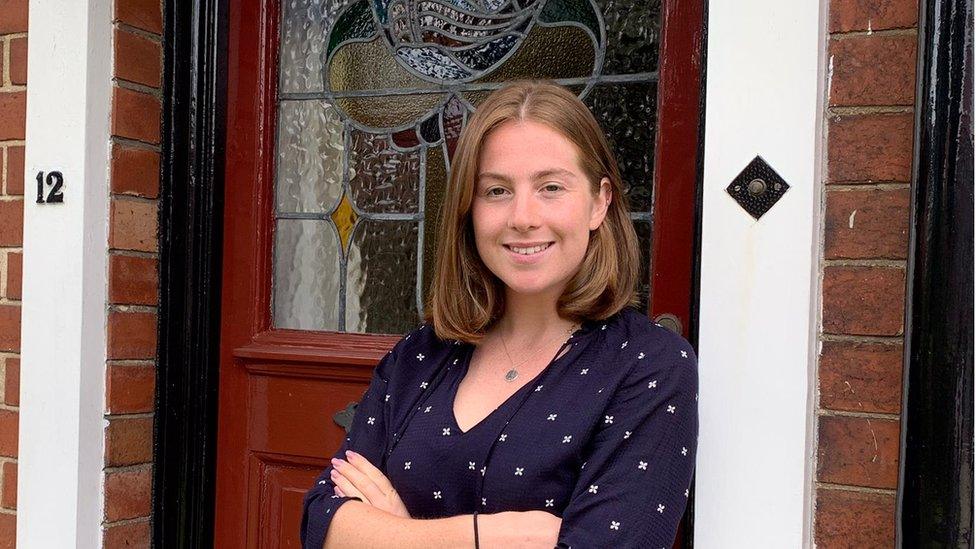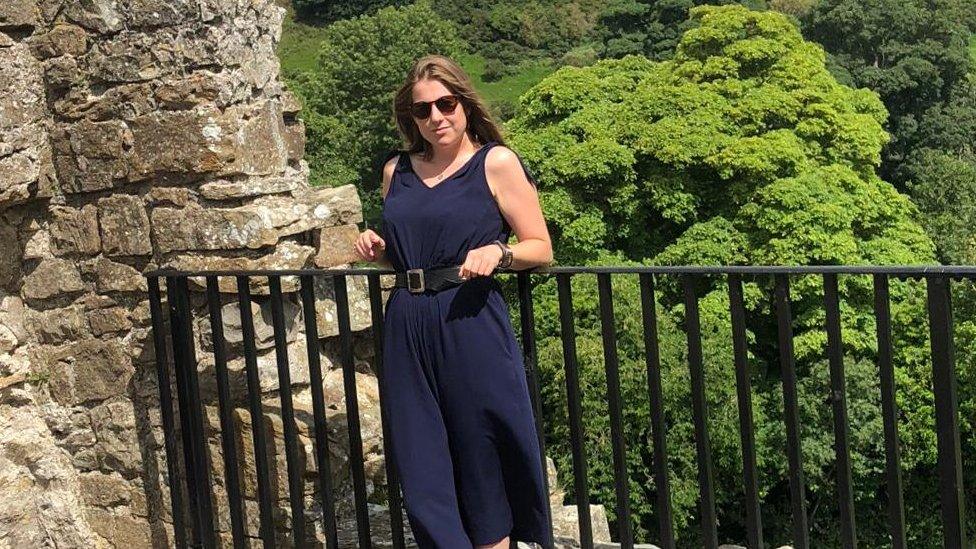First time buyers: The end of the bank of mum and dad?
- Published

Cordelia Clark was all set to buy her first home
"I can't increase my offer any more without help from Mum and Dad."
Cordelia Clark's first home felt within reach. The 27-year-old was about to scramble on to the housing ladder, but then a twist appeared.
One of the UK's biggest mortgage lenders, Nationwide, altered the rules.
There's now a tighter limit on how much your family can help you when you're getting your deposit together. The bank of mum and dad - as it's often known.
Cordelia's story
Cordelia has been looking around Scarborough for the last year and has a decent income for the area.
She'd got the biggest loan she could, and was looking for houses up to £130,000.
"It's a two-bed terrace, outdoor space, no driveway or anything but would get me on the property ladder."
Cordelia has a decent credit history but reached the maximum amount she could borrow for a mortgage.
Any more money she needed would have to come from her deposit.

Cordelia thought she had her perfect first house
The offer was in but the estate agent called and asked for a little more.
Cordelia's parents said they would help her out, increase her deposit and get her over the line.
But now Nationwide won't allow the bank of mum and dad to add so much to it.
The UK's second-largest lender has tightened its rules because of uncertainty in the economy.
Now, to get a mortgage with a 10% deposit, the buyer must prove that they saved 75% of that deposit themselves.
Other banks have not followed on with cutting out parental help but it's still early days.
Throughout the pandemic, multiple housing indexes show that the amount of first-time buyers as a proportion of the market has been falling.
Some mortgage brokers say first-time buyers with a 10% deposit or less will have seen the number of mortgage deals available to them fall by more than half., external
Nationwide told Radio 1 Newsbeat that the decision to stop the bank of mum and dad helping people get their first home is hopefully just a temporary one.
Last month Nationwide lowered the minimum deposit it needed from first-time buyers to 10% from 20 July.
But for Cordelia, it's a blow.
"If you see that the majority of the mortgage is coming from you, I don't really see it as a problem," she says.
"Your parents are there to support you - that's just the way life goes."
A Nationwide spokesman said: "This as a temporary measure which will remain under frequent review and fully gifted deposits are accepted on lending up to 85%.
"However, as one of the first lenders to return to 90% LTV lending in what remains an uncertain market, we have needed to be cautious to protect borrowers and ourselves."
LTV stands for loan-to-value. So if your LTV is 90% - you're borrowing 90% of the value of your house and putting up the remaining 10% yourself as a deposit.

Topsy Taiwo gives video help on social media to first-time buyers
Topsy Taiwo is a property expert and gives video social media advice on getting on the housing ladder.
He says the change will have an immediate impact on young people getting their first home due to the amount who only have small deposits, but it might be a good chance for them to revaluate their requirements as a buyer.
"I know a lot of people are dead set on staying in the areas they've grown up in and lived in.
"With people working from home this might be an option to re-evaluate your search criteria."

Topsy's tips
Don't put all your eggs in one basket with one lender.
Keep in regular contact with a mortgage broker.
There are still a lot of positives reasons to buy in the next six months such as the stamp duty holiday.
Look at new areas as travel times may be reduced in the future.
Look at what is going to happen in new areas e.g. new transport links.


Follow Newsbeat on Instagram, external, Facebook, external, Twitter, external and YouTube, external.
Listen to Newsbeat live at 12:45 and 17:45 weekdays - or listen back here.
- Published13 May 2020
